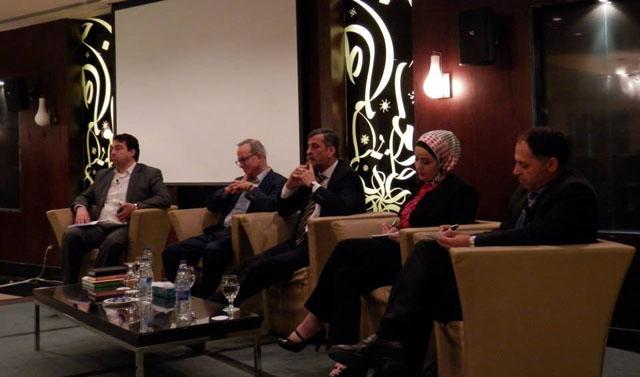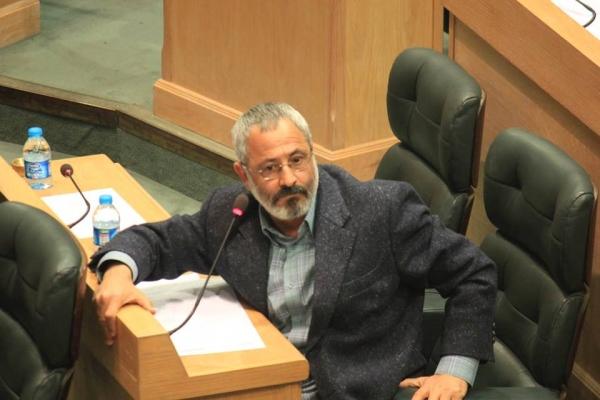You are here
New elections law needed to produce parliamentary gov’ts — politicians
By Raed Omari - Apr 17,2014 - Last updated at Apr 17,2014

AMMAN — The vaguely worded Elections Law is the major reason behind Jordan’s political and economic woes and Jordanians’ accumulated distrust in state institutions, politicians argued on Wednesday.
In a debate on the prospects of Jordan’s political reform, panellists — including ministers, MPs, political scientists and former statesmen — all agreed that Jordan needs a new elections law that can bring about competent legislators and consequently, parliamentary governments.
The debate, organised by Friedrich Ebert Foundation’s Amman Office, featured Minister of Political and Parliamentary Affairs Khaled Kalaldeh, MP Wafaa Bani Mustafa, Professor Hassan Barari and former foreign minister Marwan Muasher.
Emphasising that arriving at an election law that is universally accepted doesn’t happen even in established democracies, Kalaldeh argued that what is needed for Jordan is a new parliamentary election law supported by the majority of people and political powers that can bring competent deputies to Parliament.
“Such a law can bring about the envisioned parliamentary governments that can be held accountable before the people,” the minister said.
For Barari, a University of Jordan political science professor, a new elections law not based on the one-person, one-vote system, is the “cornerstone of reform”.
Muasher argued that the current Elections Law, which grants each voter one vote at the district level and another at the national level, brings “individualised” and “personalised” parliamentarians and not full-fledged blocs capable of pressing for collectively adopted programmes.
The same point was raised by Bani Mustafa, a member of the Lower House-based Mubadara initiative, who cast doubt over the seriousness of political reform efforts through revisiting the Elections Law.
“Mubadara” is a coalition of independent parliamentary blocs that has recently proposed an initiative to engage in the decision-making process and set the ground for “concrete economic and political reforms” in the country, giving the Lower House a greater role in running the country’s affairs by evolving into a shadow government.
However, the state is not the only party to blame for the delay in political reform, the panellists said, adding that the economic issue is a major concern for Jordanians at the moment.
For Kalaldeh, a long-time leftist, people in Arab Spring countries have mobilised primarily against long years of corruption, poverty and subjugation brought on by tyrannous regimes, with political demands being at the bottom of their list.
He blamed political parties for the delay in the reform process, accusing them of an inability to improve their discourse, but adding that authorities share the blame for their crackdown on partisan life.
“All in all, the considerable democracy we enjoy in Jordan now is the direct result of sacrifices by political parties during the 1950s,” the minister said.
For Bani Mustafa, the difficult economic situation is Jordanians’ major concern now, saying it is the only matter her constituents ask about these days.
“Jordan has seized the historic moment and has embarked on genuine reforms,” she said, attributing the delay in achieving the sought-after reform to the passive attitude shown by some political powers and those who insist on boycotting elections.
Muasher linked the solution to economic woes to having a strong political system.
Charging that the state’s affairs are handled by “anti-reform” powers, Barari also attributed the delay in achieving political reform to regional turbulence.
“Jordanians have showed unwillingness to sacrifice their country’s stability for the sake of political reform,” he said.
Related Articles
A row has surfaced between the government and the House-based reformist group, threatening a partnership that was seen as a new trend in Jordan’s political life.
AMMAN — Minister of Political and Parliamentary Affairs Khaled Kalaldeh on Wednesday said Jordan will witness a new political stage with the
AMMAN — Minister of Political and Parliamentary Affairs Khaled Kalaldeh on Tuesday said that Jordan is moving ahead steadily with its politi












